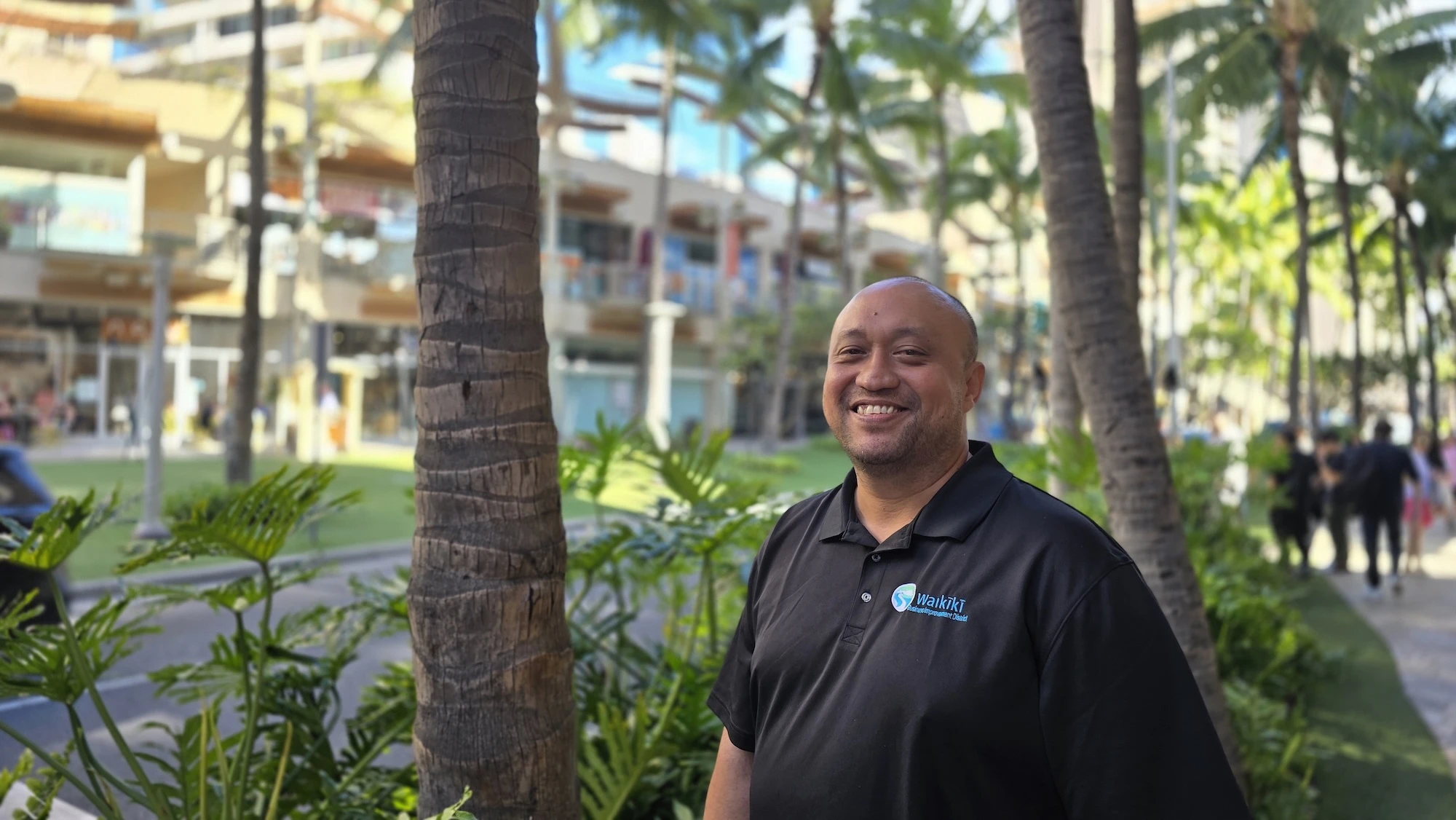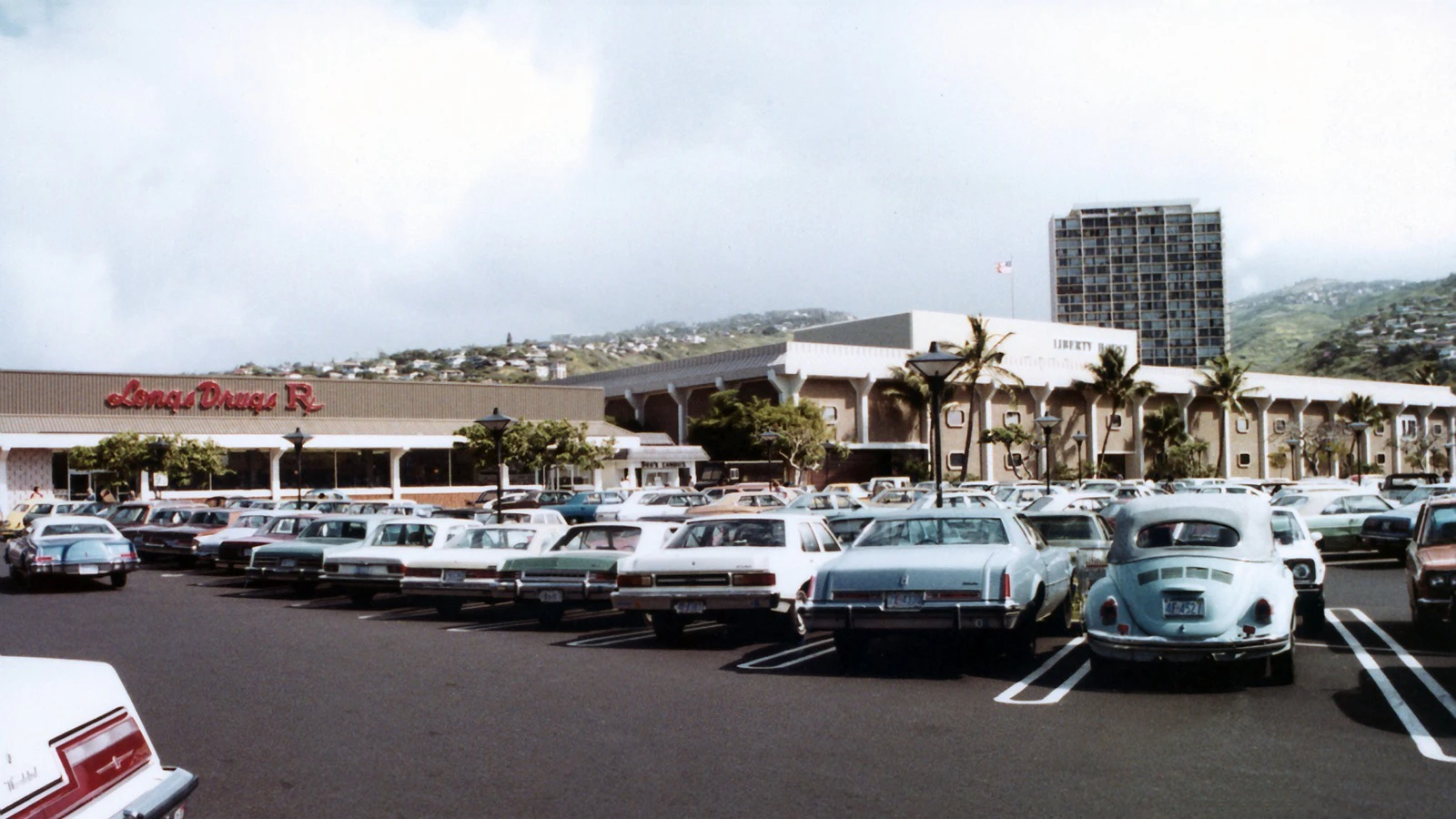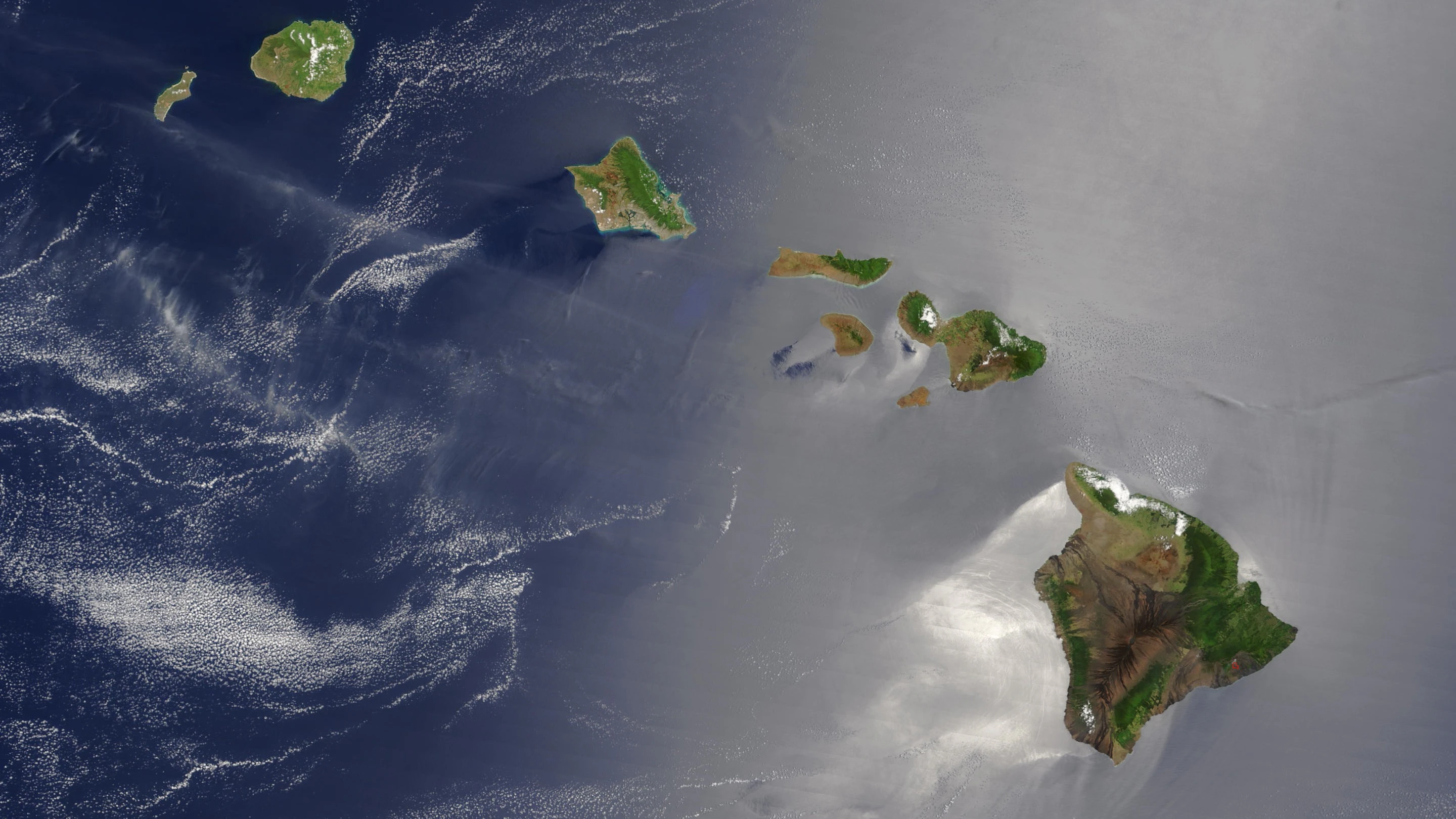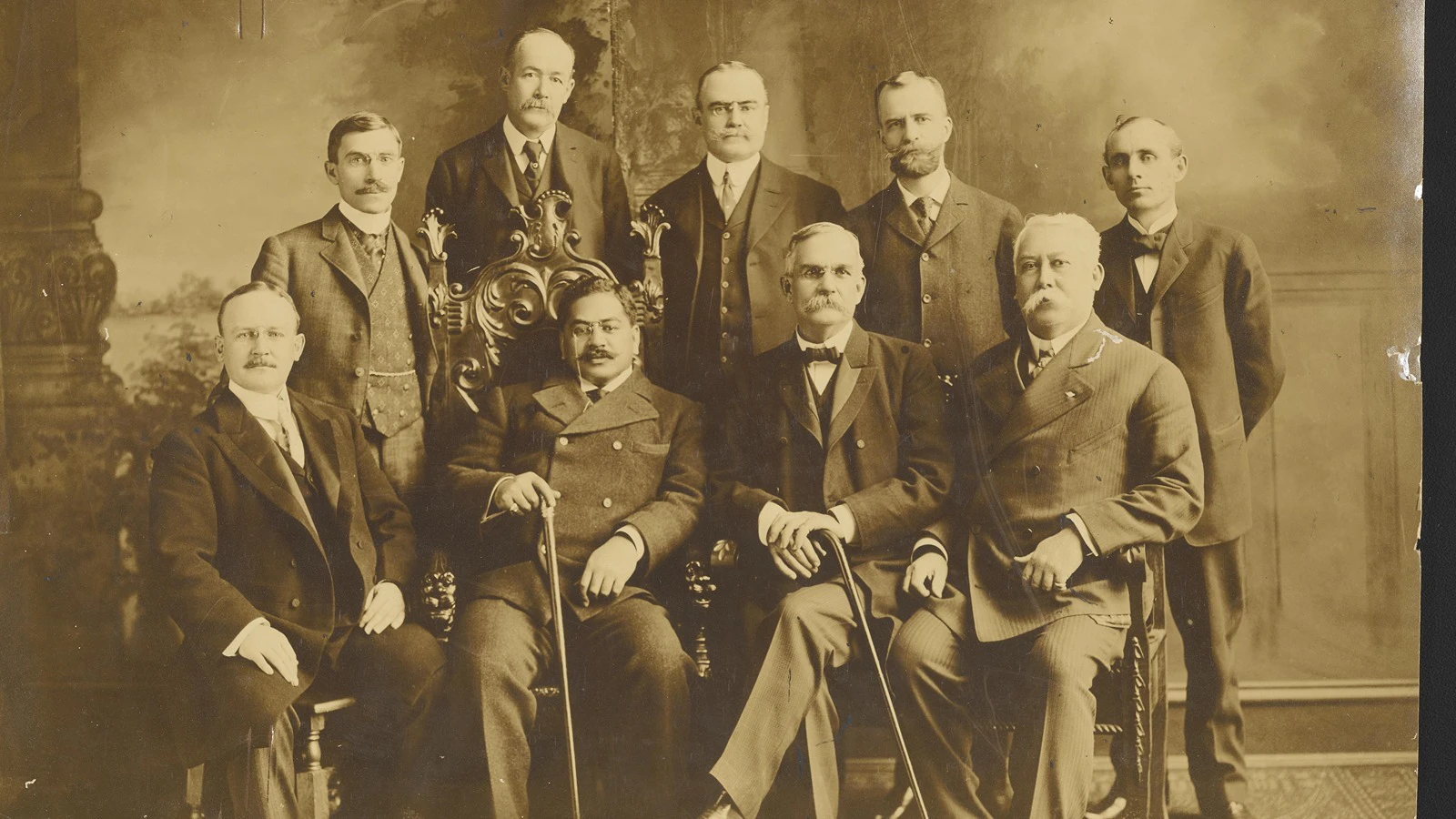Solomon Kaimimoku says a lot of people call him Mr. Aloha.
So it’s fitting, he says, that he became the general manager of the Waikīkī Business Improvement District’s Aloha Ambassador program, a role he stepped into last August.
Born and raised in Kāne‘ohe, Kaimimoku — a Castle High School graduate who previously owned a food truck and is the owner and chef at Bad Ass Burgers, a catering business — says he was looking to do something that would benefit not only his family, but his community and culture.
“When I saw this opportunity, I did a little more research on what it was,” he recently told Aloha Sate Daily. “It aligned with everything that I was praying for and meditating on and what I wanted in my life, so I went for it.”
Mālama ‘āina, he says, is “so important to my family.”
“Being able to be a part of something that’s actually taking care of the community that I’m raising my son in, was the cherry on top.”
Aloha Ambassadors
If you’ve walked around Waikīkī, you’ve probably seen them, wearing bright shirts emblazoned with “Aloha Ambassador.”
Aloha Ambassadors handle an array of services throughout the community.
WBID President and Executive Director Trevor Abarzua told Aloha State Daily it's the “core of our clean and safe program.”
According to the program’s website, Aloha Ambassadors can be contacted if you need directions to or recommendations on anything in Waikīkī; safety escorts; assistance with flat tires, car lockouts and jumpstarts; to report trash, graffiti or suspicious activities; or for mental wellness response or services.
The Aloha Ambassador Clean Team collects trash, clears debris, removes graffiti and works to maintain “an overall pristine environment,” while Aloha Safety Ambassadors engage with business owners, employees and residents on safety concerns or needs and maintains close communication with local law enforcement; and Aloha Hospitality Ambassadors are located throughout the district and can offer directions, recommendations and answer questions, the site explains.
Having these “ambassadors” is “a nationwide best practice,” Abarzua said.
But if you go to other cities that have similar ambassadors, “I don’t think they do it like us in Waikīkī,” he says. “I think that what makes us unique is that aloha spirit of it all, and just the staff that we have and the team that we have and the pride that people take in the role here.”
Language and history
Kaimimoku, who has a degree in Hawaiian studies from the University of Hawai‘i at Mānoa, says it was important for him to bring his knowledge of the Hawaiian language and Hawaiian history and present it, “not only to the community in Waikīkī, but also to my staff.”
For example, he says he works with his staff on pronunciation of words and tells them that when speaking ‘Ōlelo Hawai‘i, “it’s super important to speak it right, because in our language, you can pronounce it wrong and you’re talking about something totally different.”
“Bringing that cultural awareness to the team was super important to me," he continued. "And for them, it’s also growing their knowledge of the place that they’ve grown up in or that they’ve decided to come and move to. [It’s] super important for me to have them find a connection to this place and to the language and to the culture, because with that, when they walk around Waikīkī, they see Waikīkī as their home.”
To integrate the culture and language with the team and community, Kaimimoku said he has labeled items in the office with Hawaiian words and shares the history and stories of certain places during briefings.
“Connecting the modern things that are here to the things that are from our past in Hawai‘i is so important because they start to see the connections of ‘why this is here,’ ‘why this is named that,’” he said. “Just sharing stories, legends about Waikīkī … Just having them be aware [that] there’s a whole culture and so much history here in Waikīkī that we can share with our guests visiting.”
It makes the interaction with visitors “just a little bit more valuable” and they gain a little more insight, too, he said.
“And for the guests that’s receiving this information that I share with my team, they now have a connection to this place, and I feel like they gain a love and a respect for it as well.”
Abarzua said integrating the culture and language with the Aloha Ambassador program is “the brand,” but there’s more to it, too.
“When people come to Hawai‘i to go on vacation here, to visit here, even to move here and to live here, that’s the connection they want to feel, and that’s something that is unique about Hawai‘i,” he said. “To have that from the brand perspective is huge. But I think the biggest thing is, just from the staff perspective. What we’ve seen and what we have observed when Solomon took over is just that comfortability with their boss, in that someone that we have on our team that is from here, that did grow up here, connects on more of a deeper level to Solomon. … Solomon cares. He reaches out and makes sure that they’re OK. It’s not just a boss-to-employee relationship. It feels like a family over there.”
A staff that’s happy and like their jobs, are better ambassadors on the streets, Abarzua said.
“They’re more willing to smile at someone as they’re walking by. They’re more willing to take more emphasis in the role that they’re doing,” he continued. “I think we’ve seen an elevation in the services we’ve provided, not because of more money or more staff, just because of the demeanor of the team since Solomon took over.”
Kaimimoku said one of his goals as GM of the program is to elevate the cleanliness of Waikīkī.
“I feel like we’ve come so far, and at the point that it is … outsiders come and they see it and they’re amazed at how clean it is, and it’s because of the passion and integrity that our workers have,” he told ASD. “For myself, it’s just to upkeep that and keep it elevated even more.”
He also would like to eventually expand the program to other districts, “and be able to grow this program and really show the different cities how important it is to have this type of program, and how it changes the life and the way that a lot of these cities are looked at."
There are currently more than 50 Aloha Ambassadors, including eight who are part of its second-chance program, which Abarzua says is formerly incarcerated individuals who have recently been released, some of whom have been homeless in the past.
More information about Aloha Ambassadors can be found here.
Stephanie Salmons can be reached at stephanie@alohastatedaily.com.





